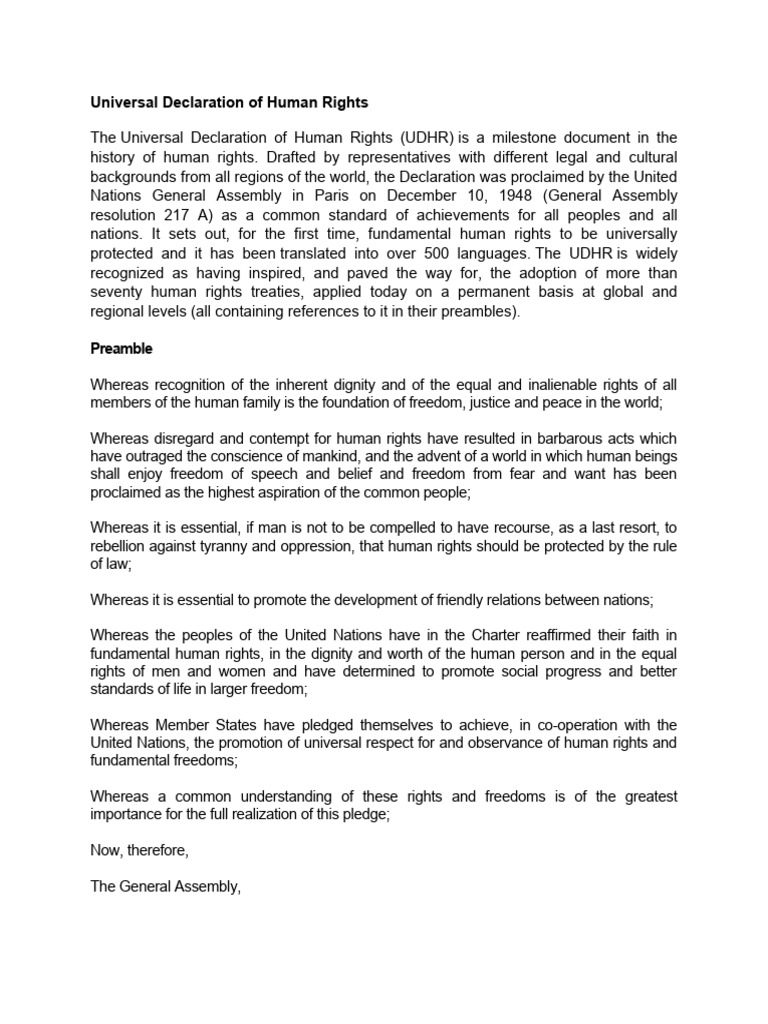The tapestry of human rights is woven from the threads of history, philosophy, and morality. The Declaration of Human Rights stands as a monument to humanity’s relentless quest for dignity and justice. This document, adopted by the United Nations General Assembly in 1948, encapsulates fundamental principles that resonate deeply with Christian ethics, reflecting a rich symbiosis between secular and sacred ideals.
To comprehend the Declaration of Human Rights fully, one must first embark on an exploration of its origins. Emerging from the ashes of World War II, the Declaration serves as a response to the egregious violations of human dignity witnessed during the conflict. As nations came face to face with the horrors of genocide and tyranny, an urgent clarion call for universal protections arose. In this context, the Declaration was not merely a political necessity, but rather a moral imperative, echoing the call of Christ to love one’s neighbor as oneself.
At its core, the Declaration enshrines a set of inalienable rights that transcend boundaries and cultures, proclaiming that every individual possesses inherent dignity. This notion is not foreign to Christianity, which emphasizes the sanctity of human life as intrinsically valuable. From the Genesis narrative, wherein humanity is created in the image of God, to the teachings of Jesus, who championed the downtrodden, the theological scaffolding of human rights is distinctly present. Each principle within the Declaration resonates with biblical tenets, offering a framework that aligns with Christian values.
One of the key principles enshrined in the Declaration is the right to life, liberty, and security of person. This fundamental right mirrors the Christian belief in the sanctity of life, urging societies to safeguard individuals from harm and oppression. The Scriptures are replete with injunctions against murder and violence, fostering a worldview that esteems human existence. The idea that each life is a divine gift compels the faithful to actively protect and uphold this right for all, creating a culture that cherishes and nurtures life.
Another profound tenet found within the Declaration is the principle of non-discrimination. Article 2 affirms that everyone is entitled to rights and freedoms without distinction of any kind. The Christian ethos echoes this sentiment, reaffirming that all people are equal in the eyes of God. In Galatians 3:28, the Apostle Paul proclaims, “There is neither Jew nor Gentile, neither slave nor free, nor is there male and female, for you are all one in Christ Jesus.” This radical inclusivity challenges the societal structures that perpetuate inequality and injustice, urging communities to embrace diversity while advocating for equity.
The right to freedom of thought, conscience, and religion is yet another vital aspect of the Declaration that finds profound resonance in Christian doctrine. The belief in the liberty to worship and express one’s faith without fear of persecution mirrors the biblical affirmation of spiritual freedom found in Christ. John 8:32 proclaims, “And you shall know the truth, and the truth shall make you free.” This principle not only celebrates individual belief but also underscores the importance of dialogue and understanding amongst different religions, fostering a spirit of coexistence.
Moreover, the rights articulated in the Declaration encompass social, economic, and cultural dimensions, reflecting the holistic nature of human flourishing. Christians are called to advocate for justice not only in spiritual realms but also in the material conditions of life. The right to an adequate standard of living, education, and social services highlights the responsibility of the larger community to ensure that all individuals can transcend poverty and despair. The parable of the Good Samaritan exemplifies this ethic of care; it is a call to action that urges believers to extend compassion beyond their immediate circles and work tirelessly towards the betterment of society.
As we consider the Declaration’s exhortations, it becomes evident that they provide a robust framework for ethical living, deeply intertwined with Christian teachings. However, the challenge lies not only in recognizing these shared values but also in translating them into action. The church, as a bastion of hope and love, possesses an unparalleled opportunity to lead by example—embodying the principles of human rights within its congregational life and societal engagements.
The intersection of the Declaration of Human Rights and Christian values invites believers to reflect on their roles as advocates for justice. Upholding human rights transcends a mere ideological alignment; it demands a transformative commitment to serving others with humility and purpose. In a world fraught with inequality, the challenge remains: how can the faithful ripple out the love of Christ in a manner that echoes the grand narrative of the Declaration?
In conclusion, the Declaration of Human Rights serves not only as a universal manifesto but also as a mirror reflecting the core tenets of Christianity. Each principle enshrined within its text reverberates with the call to action laid forth by the Gospel. The journey toward a world of dignity and justice is laden with obstacles, yet by anchoring our convictions in both the Declaration and the teachings of Christ, we can aspire to weave a future where the sanctity of every human life is celebrated and protected. As stewards of this ethic, we partake in a divine vocation, moving ever closer to a realm where rights are not merely declared, but lived and embodied in every aspect of human existence.



